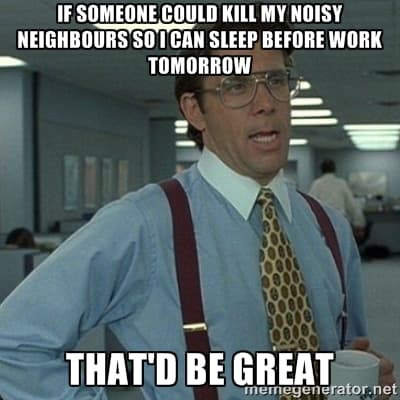Noisy Neighbour
Dealing With the Noisy Neighbour
If you’re living with a noisy neighbour, you’ll know how difficult it can be to go about your day to day life. At JCW Acoustic Supplies, we’re often ask the best way to deal with a noisy neighbour.
 A recent Which? survey found that one in four people have had a problem with a nuisance noisy neighbour in the last year, leaving people angry, irritable and stressed.
A recent Which? survey found that one in four people have had a problem with a nuisance noisy neighbour in the last year, leaving people angry, irritable and stressed.
It also found that 64% of people who have experienced problems in the last year didn’t know where to go to seek help and advice.
How can we help combat your Noisy Neighbour?
The problem is when informal communications have broken down, going down the formal route can be a lengthy process and your neighbour (if even given a noise abatement order) may refuse to abide by their order. You can also incur considerable costs from mediation or solicitor fees.
This is where we can help we have a range of soundproofing solutions ideal for making your home or flat much more peaceful and quiet
Here is an example of how DAVE can help deal with a Noisy Neighbour
How to solve the noisy neighbour problem?
Before making a formal complaint or getting others involved, try to discuss the problem with your neighbour. With most people, being calm and reasonable gets better results than being confrontational.
If you’re worried about approaching them, write a letter, explaining the problem clearly and sticking to the facts. One in three people have found that this has solved the problem immediately
Make note of noise incidents
Very often, people don’t actually realize they are being a nuisance. Few people are totally uncaring about those around them; most are just unaware of the impact it is having on you
It’s always a good idea to make notes and keep a diary of when noise or an incident occurs, and how long it lasts.
It helps you keep track of what’s been happening and when, and provides good evidence for any complaint you make about your noisy neighbour.
It will also help others to understand the issue and the impact it has on you.
If you rent or own a leasehold
If you live in a rented property or own a leasehold, you should contact the landlord, housing association or freeholder and explain the problem. They may be able to take action against your neighbour.
Escalating the problem
Complain to your local authority
Regardless of whether you rent or own your property, local authorities have a duty to investigate excessive noise.They have powers to take action against people if their behaviour is unacceptable.
If relations with your noisy neighbour have broken down, or if you don’t feel able to, or are afraid to speak to your neighbour, you should contact your local authority to report the nuisance.
Local authorities have dedicated teams assigned to deal with noise control.
Complain to the ombudsman
If you’re disappointed with the way your local authority has dealt with your issue and you have exhausted its internal complaints process, you can complain to the Local Government Ombudsman.
You should give your local authority 12 weeks to deal with your formal complaint, after which you can refer it to the ombudsman.
Going to court
As a last resort, you might want to consider legal action against a nuisance noisy neighbour.
Bear in mind that taking someone to court is expensive, so this option should only be considered if you have exhausted all other routes. There are likely to be court and solicitor fees.

